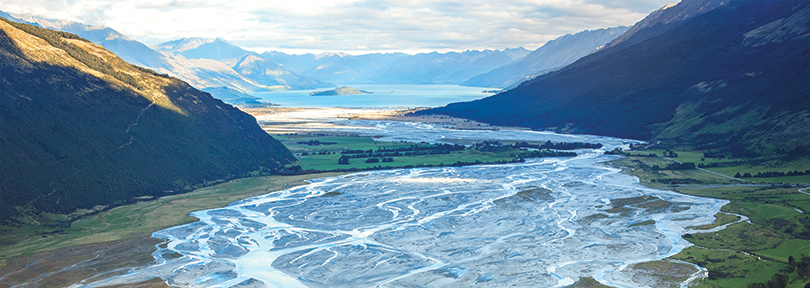Enough is enough Why Ngāi Tahu is suing the Crown over its waterways
Dec 20, 2020

In a legal first, Ngāi Tahu has lodged a statement of claim in the High Court seeking recognition of rangatiratanga over its awa and moana, to address the ongoing degradation caused by the environmental mismanagement. Kaiwhakahaere Lisa Tumahai, explains why it’s long overdue.

Above: Te Awa Whakatipu (Dart River).
We all know that something needs to be done about the water quality in our rivers and lakes in the South Island. Our natural environment is in a bad state and despite promises from elected officials for many years, action is long overdue. That is why Ngāi Tahu has notified the Government that we are going to court to force these matters to be addressed.
Te Rūnanga o Ngāi Tahu as the representative body of Ngāi Tahu, and 15 tribal leaders, are asking the courts to make declarations that we have rangatiratanga over the wai māori (freshwater) of our takiwā, and that the Crown should engage with us to jointly design a better system to manage and care for our precious waterways.
Rangatiratanga is not ownership. Owning something means using it however you like. Rangatiratanga as a concept and a practice encompasses rights, responsibilities and obligations. And that includes the obligation to do what we can to stop the continued degradation of our freshwater systems.
Our rangatiratanga in the Ngāi Tahu takiwā was recognised in our 1997 settlement with the Crown and in the act passed by Parliament in 1998 to make the settlement law. However, the source of rangatiratanga does not come from the Government, Parliament or, for that matter, the courts.
Rangatiratanga, as traditionally exercised by Ngāi Tahu since long before the signing of the Treaty of Waitangi, included managing the allocation and use of water in Te Waipounamu for food, for development and for sustainability. It was a sophisticated system. In Te Waihora (Lake Ellesmere), for example, our people regulated the level of the lake by digging trenches to the sea, and managed the allocation of different areas of water between different hapū, often in exchange for other resources, using traditional knowledge and
wisdom gained over centuries.
Most importantly, rangatiratanga came with responsibilities to do this for the benefit of present and future generations, and to ensure that waterways were protected for the health of people and the natural environment. Compare that with the “first come, first served” system of the present day, which is based on an extractive right and allows people to take far more than they need, leading to severe over-allocations of water in the whole of the South Island.
Successive governments and legislation, like the Resource Management Act, have failed to allow Ngāi Tahu the full exercise of our rangatiratanga. The results speak for themselves. Canterbury is the hardest hit, with filthy rivers and severely over-allocated water supplies. Otago and Southland are not much better. Now, our rangatiratanga obliges us to take action to stop the degradation of our rivers, streams and lakes. The Crown has consistently acknowledged that Māori have rights and interests in freshwater. Just as consistently, however, it has failed to meaningfully engage in partnership with Ngāi Tahu over the present and future of freshwater management in the South Island, despite our numerous attempts to find a solution. What progress has been made is piecemeal and inadequate. The Waitangi Tribunal in 2019 said in the report on Stage 2 of its Inquiry into Freshwater and Geothermal Resources that its hands were tied, and it could do no more to advance the matter of Māori rights and interests in freshwater until a test case was brought before the courts.
That just underscores why it is the right time for us to seek declarations in the High Court recognising our rangatiratanga over the wai, and also declaring what the Crown ought to do as a result of that recognition. We are seeking to have the Government work and co-operate with us to design a better system for water management, one that protects our environment, while still ensuring wai māori for food production and development.
We have already built on our traditional knowledge by investing in scientific research into the hydrology of our waterways. We now want to work alongside all parts of the community to help find the best way forward, using the latest science and hydrology, and our ancient knowledge of our rivers, lakes and streams. Ngāi Tahu is in this fight for the future of our rivers along with all South Islanders, and indeed the rest of New Zealand.
This article first appeared in The Spinoff on 4 November 2020.